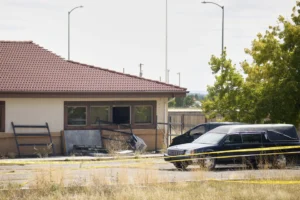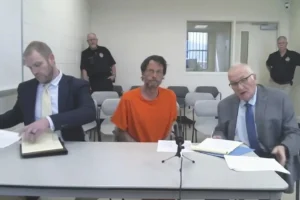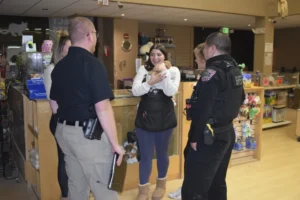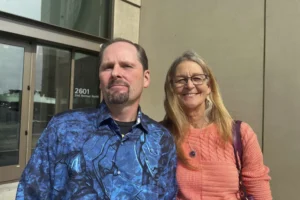Tired of Running, Former Jackson Hole Resident Prepares to Surrender on a Drug Charge
In a town without inpatient rehab, where do you turn if you have a drug, alcohol addiction?
- Published In: Criminal Justice
- Last Updated: Sep 15, 2023
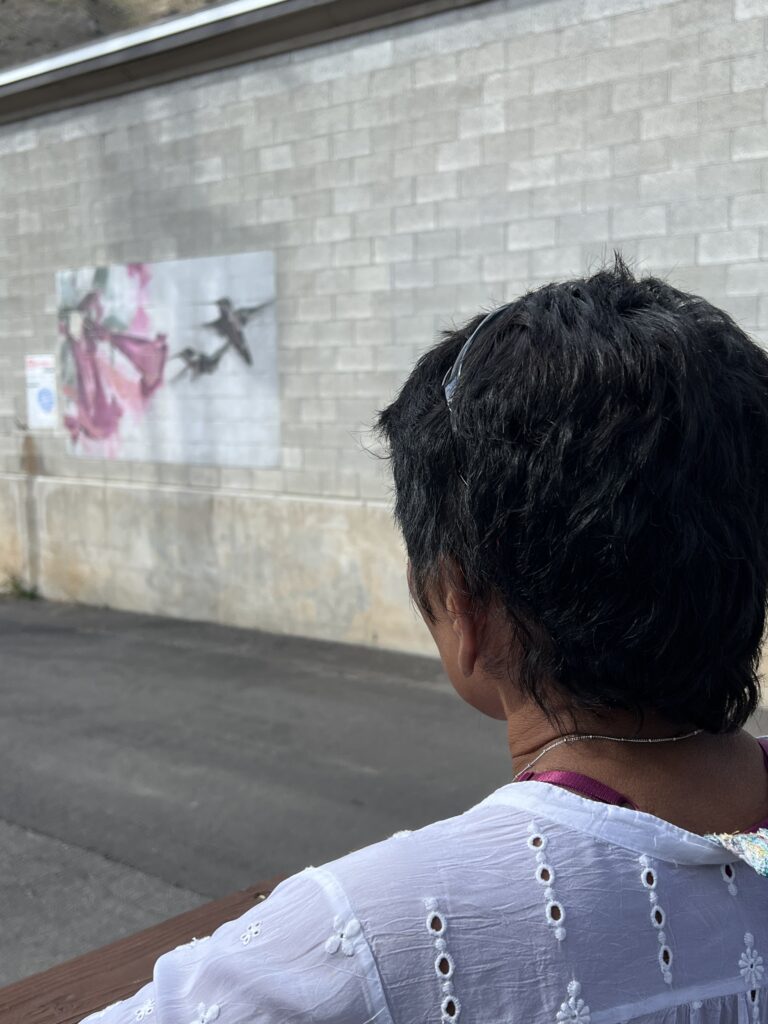
By Alec Klein
Special to the Wyoming Truth
Editor’s Note: This story is part of an ongoing series about the impact of the lack of inpatient rehabilitation treatment centers in Jackson Hole. It discusses drug addiction, alcoholism, domestic violence and sexual abuse. Reader discretion is advised.
JACKSON, Wyo.—In a matter of hours, Tricia will be surrendering to authorities, and she has no idea what will happen, whether she will be immediately booked and imprisoned, or whether there will be an interlude of freedom, one last look at the open sky.
You see, she’s been on the run for weeks, fleeing across the wide expanse of Wyoming, from Jackson to Cheyenne. After skipping a hearing, with a warrant out for her arrest, she’s finally come to terms that she’s facing a drug possession charge—for carrying less than a half gram of crystal methamphetamine in her purse, by her own admission. Meth—a powerful stimulant. A drug that can send you straight to hellfire in body and soul.
Less than half a gram. A rock the equivalent of an eighth of a teaspoon—a teardrop. Big enough to put Tricia away in prison for a time. But she’s had enough. She’s tired of her addiction.
“Spiritually, I was broken,” she says, before quickly amending that statement. “I am broken, I should say.”
Even more, she’s tired of running. She’s tired of hiding. “It’s too hard for me to go on with my life, looking over my shoulder, and I want to take responsibility for my actions,” she says in a wide-ranging interview with the Wyoming Truth in the moments before she turned herself in.
Friends drove her back to Jackson. Not directly. There was a stop on the way. It took a while. There was time to think. She wonders what she’s returning to. “There’s nothing here,” she says without looking around.
Tricia is sitting at a simple, unadorned kitchen table in town, just blocks from the sheriff’s office, mere steps from tourists clicking pictures of happy moments. She could have meant many things when she uttered those bleak words, that there is nothing. To wit: Why her? Why did this happen? How did she arrive at her debilitating addiction? Was it circumstance, genetic predisposition, accident of birth, bad luck, fate? Why? Why?
Why?
But no, what she was trying to say is that there is no inpatient rehab center in Jackson Hole—even though the mountain resort area, famed for its great natural beauty and breathtaking wealth, is plagued with something less felicitous: high rates of substance abuse.
But Tricia came back anyway. She’s ready to face the consequences. It almost feels like a confessional before the end, the direct way she tells the story of her life — a life of trauma, of death, of abuse and assault — without knowing what will come next in her personal narrative.
The Wyoming Truth is only using her first name, so that she is free to share her story, the good and the bad, without incurring further trouble with the law—or others. The aim is to adhere to the principles of the Society of Professional Journalists — to minimize harm — so that, wherever Tricia ends up, if she can make it beyond her addiction, she won’t be hounded by it.
But the sorrow stitched on her nearly 54-year-old face seems indelible; unusually large dark shadows fall like breaking boughs beneath her dolorous eyes. She weeps from time to time as she recounts the painful path that led her to this moment of truth.
The fish’s mouth
One of Tricia’s earliest memories is of her little red and white coin purse with the clip at the top, an opening resembling a fish’s mouth. She kept tokens in her purse to pay for her school lunch.
“I remember that vividly,” she says.
Tricia was about five years old, living an unidyllic life in idyllic Honolulu, Hawaii. She and her twin sister had just spent the day with their father, a strapping Puerto Rican man who worked as a maintenance worker; he had separated from their Hawaiian mother, a nurse’s aide. Tricia had always felt her father’s love in the way he gazed with adoration at her and her twin sister, when they took hula dancing lessons, or when they sang beautiful songs of their Baha’i faith, which teaches the worth of all religions.
“O God, guide me, protect me,
“illumine the lamp of my heart,
“and make me brilliant star.
“Thou art the Mighty and Powerful.”
“We were his everything,” she says.
On this day, Tricia forgot her coin purse in her father’s car after he dropped her and her twin sister off with her mother. “I’ll bring it back to you the next day when I pick you up from school,” he reassured her.
It never happened. “I waited and waited,” she recalls. “My mom didn’t know how to tell us.”
What she couldn’t find the words to tell her daughters right away was that their father sold drugs and that he had been stabbed while he slept. He bled to death, the end result of a deal gone bad.
The shock and trauma only worsened when Tricia’s mother went on to marry a man who began molesting Tricia and her twin sister when they were six years old. This nightmare continued for about four years—until he was caught in the act. But by then, Tricia found herself on a path of rebellion. At 15, she gave birth to her first child, a boy.
“I was seeking love, I guess” is how she explains it.
Instead, she found abuse. Her boyfriend — a welder who was not much older than Tricia — repeatedly beat her, leaving her with black eyes, while he introduced her to another form of destruction: alcohol, marijuana and cocaine.
For Tricia, the concoction of drugs and alcohol “felt like I was escaping… They let me escape my reality.”
That reality involved Tricia giving birth to another boy, and by the age of 17, she dropped out of school. “I was, by then, an addict,” she says matter-of-factly. “Drugs and alcohol and abuse was my life.”
That is, until she turned 19 and fled her abusive boyfriend, running all the way to the remote Hawaiian island of Kauai, where her mother and twin sister lived. Trouble, though, had a way of finding more trouble.
Tricia found herself in a relationship with a dealer who sold cocaine before she met another man at a Christmas party. On that first evening, they consummated their relationship, and she got pregnant for a third time. The way she viewed it, he seemed normal. He owned a construction company. She was trying to “get my life right.” She wasn’t in love with him. So, she married him. Tricia had already lived a lifetime. She was 21 years old.
“I didn’t know what ‘good’ was,” she says through tears. “I didn’t appreciate his kindness. He didn’t hit me. He let me speak.”
They became the parents of two girls. Over 30 years later, in the wake of all the turmoil and oblivion, she’s not sure whether they’re still technically hitched, though they have been apart for two decades. “I think I’m still married,” Tricia says.
Not long after their wedding, they moved to a remote part of Washington state—but she couldn’t shake her addiction. “I took that with me,” she says. And her husband could no longer ignore his wife’s addiction. They moved to Colombia, where he was from, with their two girls. But Tricia continued to drink and, eventually, he gave her an ultimatum that amounted to an unbearable “Sophie’s Choice”: He told her to return to the United States without him, but she could only take one of their daughters. She could choose. She chose the younger daughter whom she was still nursing.
Breaking point
There is, at some juncture, when a person reaches the breaking point. When the fight is gone. For Tricia, she had arrived there. She returned to Kauai. Back with one of her abusive ex-boyfriends. Only now, her addiction led to a different kind of trouble: with the law.
Over the ensuing decade, she ended up in and out of jail, first for felony fraud; broke, she had declared she was taking care of two children — not one — when she applied for public assistance. She served a year in jail for that. Later, she caught charges for misdemeanor assault. And, as a part of her spiral, she said, “I became a dealer.” Cocaine, first. Then, meth.
By the time Tricia reached her early 40s, she was in jail again, this time on felony drug possession with the intent to distribute. When the jail did some routine medical testing, she found out she was infected with hepatitis C, a serious condition often caused from sharing unsterile needles. Tricia, as it happened, had escalated her addiction, taking cocaine and meth intravenously. Directly into her blood stream. For a better hit.
Tricia had lost custody of all four of her children. Some, she hadn’t spoken to in years. In jail, she kept having the same dream, God telling her to contact her mother whom she hadn’t seen in 20 years. “She didn’t like who I was,” Tricia says.
When she finished her jail stint, Tricia called her mother, who answered the phone and proceeded to tell her daughter that she was dying of lung cancer. Tricia decided to spend those last days reunited with her mother.
She also entered a Christian-based inpatient treatment program on the Big Island of Hawaii, spending a year fighting to become sober. “I embraced it,” she says. “I embraced sobriety.”
In the process, she attended Bible-based classes and threw herself into community service. Tricia can’t explain it but something happened along the way, a translucent transformation within her. She just gave in — not up — to faith in God.
“I surrendered,” she says, spreading her arms wide, tears in her eyes. “Freedom from me, from my bondage.”
The inpatient treatment program was so powerful, Tricia enlisted to stay for another year as an intern, wanting to give back to those who were suffering the same afflictions of addiction. She even returned to the jails that had incarcerated her, to “show my people this is possible,” she says of recovery.
After her mother passed away, Tricia went to visit her twin sister, who had by then moved to Jackson Hole where she worked as a night auditor at a hotel. They hadn’t seen each other in eight years. It was about 2015. “I came to visit and ended up staying,” Tricia says.
There was something about the majestic Teton mountains that reminded Tricia of the lush beauty of Kauai.
“I love the mountains,” she says.
First, she got a job at the local McDonald’s, taking burger orders and cleaning bathrooms. She and her twin sister spent a lot of time together, just like old times. Eating together. Going to parks. Taking walks. Tricia ended up getting a job working the front desk of another hotel.
In about 2019, Tricia relapsed: marijuana and meth. Was it because her boss was using? Or because of the grief after the man she was seeing fell asleep at the wheel and died? Who can say for sure? But, she says, “Life starts spiraling.” And it’s been that way since.
“I’ve been struggling with my addiction,” she says. There is, though, a hint of hope in her voice when she adds, “I’m getting off meth.”
She just got out of another abusive relationship, this time with a man who covered her face with polyurethane while she slept. Why? Oh, why? There’s that question again. She doesn’t know. The polyurethane, she says, explains the dark “scars on my face,” under her eyes.
Tricia wants — yearns — to start over. It begins today. On a bright, clear day in Jackson Hole, a place of infinite beauty and, perhaps, hope. Because it has to. Because it can’t begin any sooner. Today, she will turn herself into authorities.
“I will,” she says resolutely, “do the time.”


